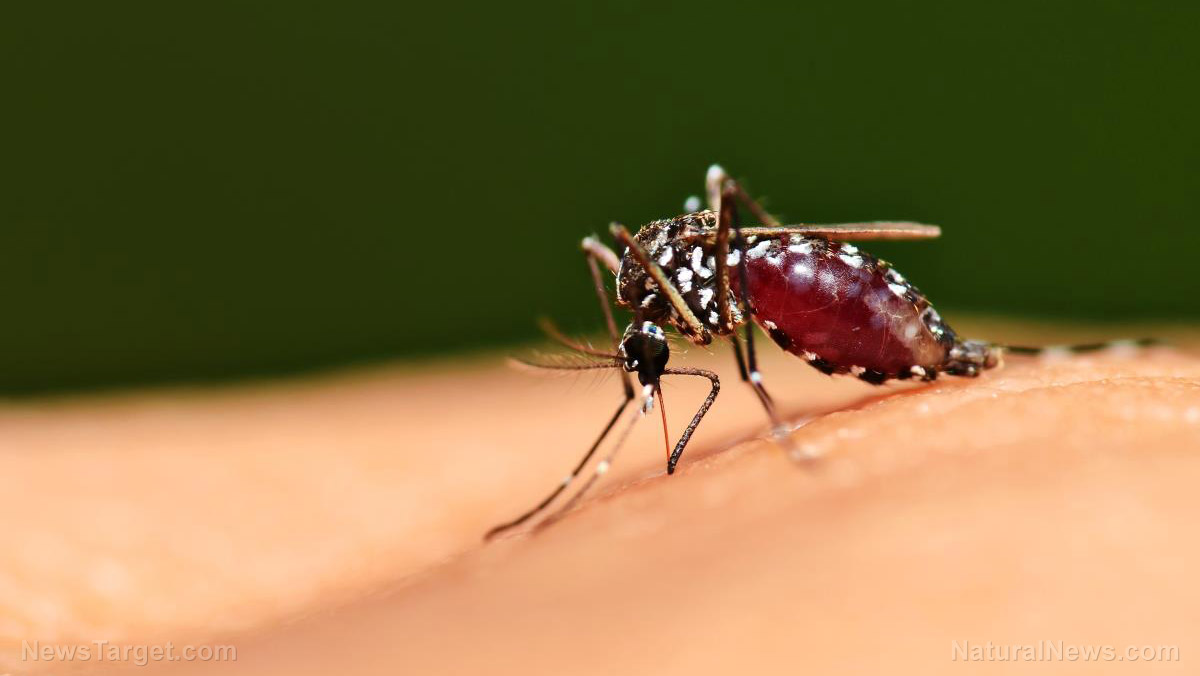Mosquitoes find human targets by following the CO2 they exhale: Study
05/13/2020 / By Divina Ramirez

A recent study, published in Current Biology, revealed that mosquitoes track their targets – including humans – based on the smell of carbon dioxide. Human breath is loaded with this particular gas, and this leads mosquitoes to their target better than visual cues.
Carbon dioxide alerts mosquitoes to potential hosts
Previous research has established that mosquitoes require both smell and sight to find hosts. But experts were unsure regarding to what extent mosquitoes relied on either sense.
To answer this question, a team of American researchers collected data from 250 female Aedes aegypti mosquitoes. This particular species is the main vector that transmits the virus that causes dengue. The researchers used female mosquitoes since the males do not feed on blood.
The researchers tracked the behavior and brain activity of the mosquitoes via a series of experiments. These experiments were conducted in a controlled, cylindrical environment that measured seven inches in diameter. Here, the researchers measured the mosquitoes’ wing movements upon their exposure to different odors and visual stimuli.
The researchers found that one-second puffs of air that contained five percent carbon dioxide triggered the mosquitoes to beat their wings faster. Human breath is comprised of 4.5 percent carbon dioxide.
The mosquitoes also reacted similarly in response to a horizontal bar that moved around the test environment. But the researchers observed that the mosquitoes beat their wings a lot faster upon exposure to carbon dioxide before seeing the horizontal bar. The mosquitoes did not produce the same reaction when the researchers first showed them the bar before exposing them to carbon dioxide.
The team then subjected a modified strain of the A. aegypti mosquitoes to the same tests. These mosquitoes’ brain cells were designed to glow fluorescent green upon stimulation. In this second set of experiments, the researchers found that the regions of the brain linked to visual cues lit up upon exposure to carbon dioxide when it was followed by the moving horizontal bar.
However, the reverse was not true. Seeing the horizontal bar first before being exposed to carbon dioxide did not stimulate the regions of the brain that controlled smell. Senior author Jeffrey Riffell stated that, for the mosquitoes, “smell triggers vision,” but not vice versa.
Based on these findings, the researchers concluded that mosquitoes use smell to compensate for poor vision. They also noted that the results of the experiments might prove useful for future studies on methods for mosquito control and the prevention of mosquito-borne diseases.
Plants can repel mosquitoes
Mosquitoes still pose health risks in impoverished and vulnerable countries. Fatal and infectious diseases, like dengue and malaria, are caused by mosquito bites in regions with little to no access to healthcare.
But even without the threat of these diseases, mosquito bites can still cause severe skin irritation and rashes. In particular, they tend to be a problem in the summer months when people go out in droves to revel in outdoor activities like hiking, camping and sunbathing.
Most people tend to use DEET (N, N-diethyl-meta-toluamide) repellents to ward off mosquitoes and other bugs, but research shows that these products can cause adverse side effects like skin irritation, redness, rashes, inflammation, headaches and shortness of breath. Extensive studies have also established that DEET repellents are toxic to birds, fish and crustaceans. (Related: Mosquitoes now developing resistance to DEET bug spray chemical.)
Luckily, there are several plants whose innate fragrances make them act as natural mosquito repellents. Cultivate these in the garden or bring them along in small flower pots during your next summer trip to ward off mosquitoes.
- Lavender
- Marigold
- Citronella
- Catnip
- Rosemary
- Basil
- Geraniums
- Bee balm
- Mint
- Floss flower
- Sage
- Garlic and onion shoots
It is also good practice to eliminate sources of stagnant water where mosquitoes tend to breed. People in tropical regions can also consider installing screens on doors and windows to keep mosquitoes and other insects out.
For more stories on plants and plant-based ingredients that ward off mosquitoes, visit PlantMedicine.news.
Sources include:
Submit a correction >>
Tagged Under:
discoveries, herbal medicine, Herbs, mosquito control, natural cures, natural ingredients, natural insect repellent, natural medicine, plant medicine, remedies, research
This article may contain statements that reflect the opinion of the author
RECENT NEWS & ARTICLES
Infections.News is a fact-based public education website published by Infections News Features, LLC.
All content copyright © 2018 by Infections News Features, LLC.
Contact Us with Tips or Corrections
All trademarks, registered trademarks and servicemarks mentioned on this site are the property of their respective owners.





















